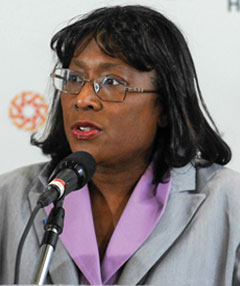Influential person: Dr. Virginia Caine
Marion County Health Department director
To say that Dr. Virginia Caine has been busy these days would be a gross understatement. During her decades of service as director of the Marion County Health Department, she’s always kept on the go, but the pandemic has tested her stamina like nothing else.
“There’s no other illness that I’ve ever faced that’s been like COVID-19,” Caine said. “We had H1N1 back in 2009, HIV, which started in 1985-’86, and even Ebola. But nothing like the coronavirus.”
Coping with the virus has meant conducting hundreds of electronic and in-person meetings to coordinate the county’s response. It’s all in a day’s work for a first responder—one who’s quick to shine the spotlight not on herself, but on the rank-and-file health care workers who make the same sacrifices daily. Plus, the essential workers in all professions, from grocery clerks to bus drivers, who have kept the country moving even during the disease’s darkest days.
“I believe that ‘tireless’ is a very overused adjective, but if there was ever anyone to whom it genuinely applies, that person is Dr. Virginia Caine,” said Dr. Lisa Harris, Eskenazi Health CEO. “How fortunate are we to have this tireless champion of public health to meet the crisis that is COVID-19?”
When it comes to dealing with dangerous new diseases, Caine is something of an old hand. In the early days of the AIDS crisis, she created Indianapolis’ first HIV health care delivery system. She was also principal investigator for the Ryan White Title III funds, establishing the first AIDS clinics in 10 community health centers and in major city hospitals and providing resources for community-based prevention programs.
She also won praise for her efforts battling Black infant mortality. Back in 1987, the city had the highest Black infant mortality rate in the nation—slightly more than 26 deaths per 1,000 births.
“With the help of a lot of community leaders, we were able to reduce the mortality rate to its lowest ever in the history of Indianapolis,” said Caine, who served as co-director of the Indianapolis Healthy Babies Initiative. “Just last year [2019], we were able to get our Black infant mortality rate down to 10.9 per 1,000.”
But Caine said she has plenty of tasks still on her plate. In the future, the city’s biggest health challenge will be addressing the social determinants of health, such as poverty and mental wellness. Unfortunately, the solutions to such problems can’t be found in a syringe or a hospital room. Or at least, not often. They will require coordination of organizations ranging from food pantries to psychiatric services.
But the issue, in her view, goes beyond “health” in its narrowest sense to broader economic issues. Put simply, it’s hard to maintain a healthy mind and body when you can’t, say, make rent.
“I really think we need to push for a living wage,” Caine said. “Not settle for the minimum wage we have now that’s been in place for decades.”
Please enable JavaScript to view this content.











































